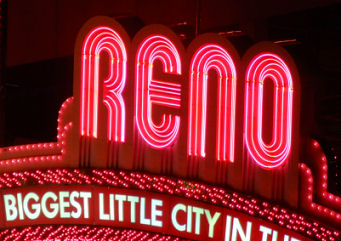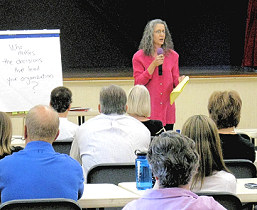
Greetings from Reno, Nevada!
I thought it might be fun to share some of what we have been doing on this incredible trip, and figured I would start with the mini-workshop we did on Tuesday – Building an Energized Board.
I love doing this particular talk. First, I love talking about boards, as I really believe boards are the most neglected, most often-blamed, most powerful force for change in our sector.
And so, instead of vilifying them (“They leave their brains at the door! They don’t know their role! They won’t fundraise!” and all the other nasty things people say about boards), I love to energize and inspire boards. I love to show boards their potential for creating change – the reason they got on the board in the first place. And I love to show boards how to govern for that.
So how does one energize a board? First, we show them how to govern for what they care about – making a difference in the community. We show them how to align accountability for the means (legal and operational oversight) behind accountability for the end results they provide to the community.
Then we energize boards by showing them how to remove HUGE chunks of time from their board meetings by using a consent agenda. We show them how a consent agenda allows time for discussing the difference they want to make. Or talking about the values they want to model to the community. Or talking about how they might measure the impact the organization’s work is having.
And then we energize boards by building recruitment processes around that energy, showing them how to recruit for What Matters Most to them and to their communities.
And finally, we energize boards by understanding why boards do not want to fundraise – that it is a serious reason, and one consultants would do well to pay attention to, rather than tsk tsking and suggesting that boards should just “get over it” and get out there and raise money. And so, we energize boards by encouraging them to engage community members in the organization’s mission – not for the purpose of asking for money, but for the end goal of building an engaged community. And that when they build that engagement, the money comes in – and so does all sorts of other support.
In other words, we teach that an energized board is engaged in making a difference, and engaged in engaging others to help make that difference.

We did all that in 90 minutes, with a book-signing afterward. And even the most skeptical among the crowd took me aside afterwards to tell me, “I have been on boards for years, and only came because our board chair couldn’t make it. And I can’t believe it, but I really do feel energized! There is so much more boards can be doing, that wouldn’t be hard to adopt!”
And that, of course, is the point. It is the point behind all the work Dimitri and I have been doing these past 10 years – developing systems that do not require the ongoing need for intervention.
If we cannot provide systems that boards can easily and happily maintain on their own, what is the point of creating a system no one can follow? No wonder boards catch so much blame – could this sector have made governance work more complicated?
So that was just one stop during our terrific stay in Reno. I will catch you up on the rest of our journey over the next few days, including the incredible community-wide Family Financial Security Summit we facilitated today on behalf of the United Way of Northern Nevada – a summit aimed at the question, “What would it take to build a community where families are financially stable?”
Until then, I hope you all are enjoying your week as much as we have been enjoying ours!
(UPDATE: You can find the Family Financial Security Summit post here – what a great day that was!)

I really enjoy your posts. So much of what you do resonates with my community vision – one I burn to share around me. Should you ever come to Eastern Canada, let me know, I’ll find a way to atend your workshops for sure!
Jo-Ann Toulouse
Thanks, Jo-Ann! We will look forward to that!
Hildy